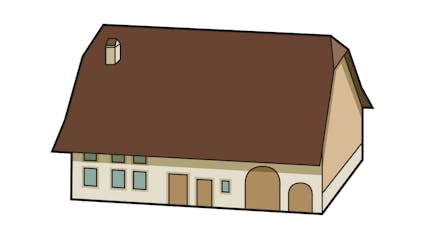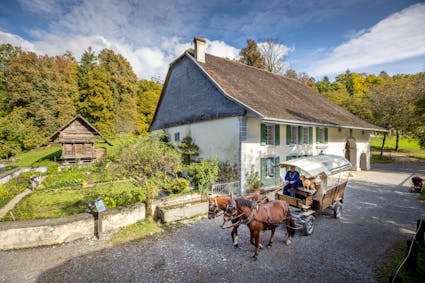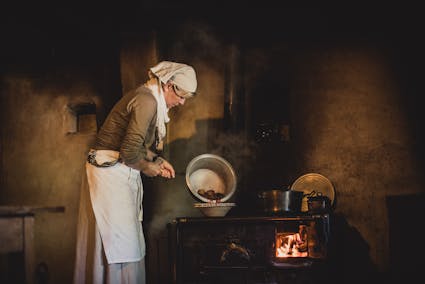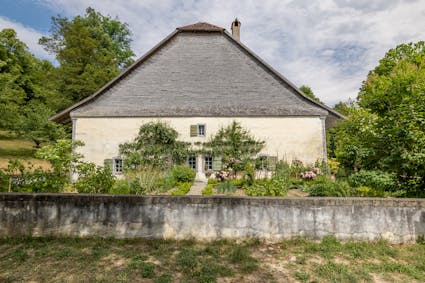531 – Farmhouse from Villars-Bramard Vaud, 1800
The wide farmhouse with its stately doors and windows makes quite an impression.

More seeming…
The wide farmhouse with its stately doors and windows makes quite an impression. Older farms in the border region between the Vaud and Fribourg are modest. In 1800–1801 the farmer Jean-Fancois Fattebert built a house here that was three times as large as its predecessor. Colour and decorative elements gave the new building the elegance of an urban bourgeois house.

… than being
Plan and arrangement of the house and its rooms are traditional. In Vaudois houses of the time, the interior failed to fill the promise of the exterior. Often the upper storey remained for various reasons unused. In the house from Villars-Bramard parts of the upper storey also remained in rough construction. Nevertheless it displays shingled gables, sandstone and marine limestone on the embrasures, plenty of wood in the interior appointments and a chimney like one in the big city. Compared to its predecessor from the 17th century it was revolutionary…

A political house
In 1536 Berne had conquered the Vaud and administered it as vassal state ever since. Bernese bailiffs collected taxes here and in Argovia. Other federal states also enslaved their neighbours. Thurgovia, Lower Valais, Sarganserland and many other regions were vassalised. In 1798 French revolutionary troops invaded and the old Confederation fell apart like a house of cards. Vassals became equal-righted members of the Helvetic Republic. Many Vaudois farmers who after 1780 had acquired wealth due to innovations in agriculture now risked new houses with imposing facades. They thus demonstrated their newly gained position as free citizens, among other things by such building projects. They expressed their pride in the colour of their window shutters – green for free Vaud!

“Pure Swissness” tour
Cooking and baking just like old times
In the olden days, farmers’ wives prepared a variety of hearty Swiss dishes every day using simple methods, over an open fire or in a wood-burning oven. A lot of skill was required to keep the oven at a constant temperature using wood, without a thermometer. Don’t miss our traditional farmhouse cuisine and sample freshly prepared delicacies such as apple cake, tarte flambée and much more. Baking and cooking take place every day either in the Oven House from Breitenried FR (513) or in the Farmhouse from Villars-Bramard VD (531) – just like in the olden days!

Ballenberg
Swiss Open-Air Museum
Museumsstrasse 100
CH-3858 Hofstetten bei Brienz
Opening hours Administration
3 November 2025 to 8 April 2026
From Monday to Friday
8.30 am to 11.30 am
1.30 pm to 4.30 pm
Opening hours
9 April to 1 November 2026
10 am to 5 pm daily